The Battle Of Algiers
Introduction
Colonialism is very much a dirty word now, but it used to be all the rage as Monarchs and Emperors vyed to show just how powerful they were by conqering countries around the world to see just how far they could stretch their rule. All the major European powers had their own colonies around the world, and some still do. Most of the major colonies have long since seen independence, mostly as post-World War II attitudes changed and the world decided to move on. Algeria was a French colony, originally invaded by the French in 1930 but not completely subjugated until around the turn of the 20th Century, at which point over 50,000 French people had emigrated into Algeria and approximately a third of the Algerian native population had disappeared.
Native Algerians, particularly those who were either Muslim or of non-European origins, were treat like second class citizens and were not allowed to vote or have any rights to French citizenship, despite swathes of the population fighting for the French and helping to liberate the mother country during World War II. This led to the formation of the FLN, the National Liberation Front, who started a guerrilla war called the Algerian War of Independence or Guerre d'Algérie. This war started in 1954 and was eventually crushed by the French in 1960, but as with most revolutions, the end of direct action by the Algerians wasn't the end of it and the French found themselves having to grant Algeria its independence formally in 1962.
A leading member of the FLN was Saadi Yacef, who wrote the best-selling book The Battle of Algiers. Yacef teamed up with Italian direct Gillo Pontecorvo to dramatise the events of pre-Independence Algeria, focussing on the pivotal Battle of Algiers. The FLN had started to hit back at the French with bombs, starting with a trio of devices at two café's and the offices of Air France. In retaliation to the escalating violence and guerrilla tactics, the French brought in an elite Paratroop regiment under the command of a decorated war hero and ex-member of the French resistance, Colonel Matthieu in the film (played ably by Jean Martin).
Pontecorvo's idea was not to make a straight forward narrative film but to create a documentary style picture and filmed in black and white rather than colour stock in order to achieve authenticity for this style. Other than Jean Martin as the French lead, Pontecorvo preferred to shoot with people with interesting faces and looks rather than trained actors and with Yacef's contacts within Algiers, he managed to get the cooperation he needed to film in the style he felt the subject required. Pontecorvo even managed to persuade Yacef to play himself in the film despite the latter's initial reservations.
Dramatising the events in Algiers between 1954 and 1962, The Battle Of Algiers is a pivotal film that is consistently recognised as one of the greatest films of all time and, rather bizarrely I think, was recently studied by the Pentagon in an attempt to identify what revolutionary stirrings could be uncovered by the invasion of Iraq.
Oscar nominated in both 1967 and 1969, the Battle of Algiers won the Golden Lion Award at the Venice Film Festival in 1966 and the UN Award at the 1982 BAFTA's.
Picture
This version/re-release has been remastered and restored from the filmmaker's archive prints and includes previously lost, albeit brief, footage. Filmed in a documentary style in black and white, when the world was filming in colour, this film has never looked better despite some shots looking quite worn. Overall this is a clear and pretty sharp picture considering.
Extras
The Making Of The Battle Of Algiers - a 20 minute interview with director Gillo Pontecorvo
The Real Battle Of Algiers - a 20 minute interview with producer/star Saadi Yacef, head of the FLN in Algiers and on whose book the film was based.
Photo Galleries - three galleries including one of actual photographs of the FLN in action
Overall
The Battle of Algiers is a gripping film that is a stunning mix of styles, part documentary, part thriller. It was an inspired choice by director Pontecorvo as it is likely that filmed either as a straight documentary or thriller that it wouldn't have worked. The use of non-actors was also inspired and despite Jean Martin portraying the iconic image of Colonel Matthieu, it is really Saadi Yacef as himself and Brahim Haggiaf as the other main FLN leader Ali La Pointe that are the stars of the film - along with the people of Algiers, who appear in huge numbers.
The Battle of Algiers is an electrifying masterpiece that highlights that the will of the people can be crushed by force but will never die if they wish to control the destiny of their own country - a lesson not yet learnt in post-Saddam Iraq, but it will be eventually. The French thought that all they had to do to win the battle for Algiers was to systematically cut out the body and remove the head of the FLN, and they did this using tactics such as torture and extreme violence. By 1960, they may well have captured or killed the leadership of the FLN but never dampened the spark for democracy and independence that burned within the hearts of the Algerian people, as the spontaneous uprising in 1962 that ends the film (two years prior to independence) clearly shows.
The greatest accomplishment that Pontecorvo achieved with his film was an even-handedness in the showing of events from the perspectives of both sides of this conflict. You see both Yacef and Matthieu struggle with the inevitability of the methods they feel they must use in order to defeat each other; Matthieu and his use of torture and Yacef blowing up innocent civilians with his bombs. Both understand that these methods will help them achieve their aims, but both are equally disheartened with the realisation of just what they have to do. This film never descends into a good vs evil narrative with both sides striving to do what they feel is right against the violence they believe is horrid and wrong.
A stunning film and a great re-release that amply demonstrates the futility of invading another's nation…
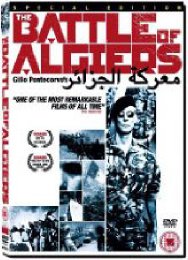
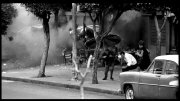
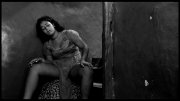
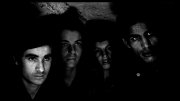
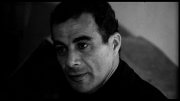
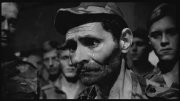
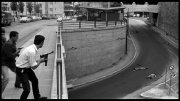
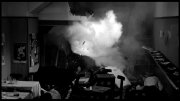
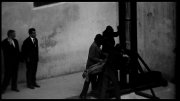
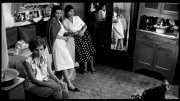
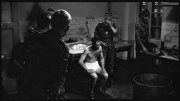
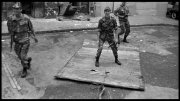
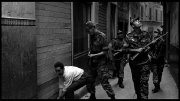
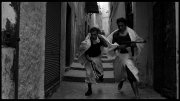
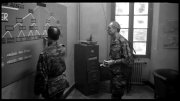
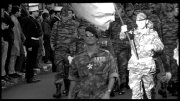































Your Opinions and Comments
Be the first to post a comment!